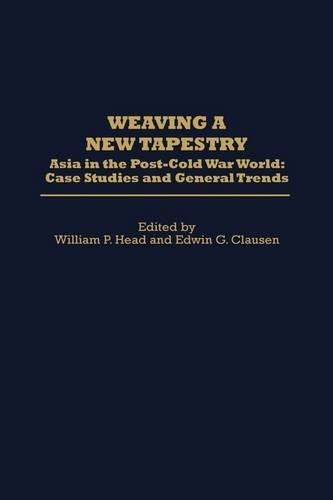
Weaving a New Tapestry: Asia in the Post-Cold War World, Case Studies and General Trends
(Hardback)
Publishing Details
Weaving a New Tapestry: Asia in the Post-Cold War World, Case Studies and General Trends
By (Author) Edwin G. Clausen
By (author) William P. Head
Bloomsbury Publishing PLC
Praeger Publishers Inc
30th March 1999
United States
Classifications
Tertiary Education
Non Fiction
Asian history
Political economy
Pollution and threats to the environment
Gender studies, gender groups
950.42
Physical Properties
Hardback
400
Description
The fall of communism in the Soviet Union and Eastern Europe has affected nations throughout the world. This broad-based study examines how this major historical event has influenced the governments, societies, economies, and foreign relations of Asia. The work of 15 scholars is divided into three sections: Economic Development and Environmental Impact; Politics and Foreign Relations; and Social and Women's Issues. Chapters span the far reaches of Asia, from Japan to Pakistan, from China to the Philippines. This first thorough interdisciplinary analysis concludes that nations such as Japan, India, and the Philippines have been less influenced than China, Korea, and Vietnam. In each case, while direct impact of the end of the Cold War has been minimal, there is strong evidence of more subtle effects. The breadth of the regional coverage and the diversity of the subject matter will interest scholars and researchers alike. The authors pose as many questions as they answer, and their conclusions are certain to stimulate debate.
Author Bio
WILLIAM P. HEAD is Chief Center Historian, Warner Robins ALC, Robins AFB, Georgia. He received his Ph.D. in U.S. Diplomatic History from Florida State University in 1980. His most recent publications include Looking Back on the Vietnam War: A 1990s Perspective of Decisions, Combat, and Legacies (Greenwood, 1993), The Eagle in the Desert: Looking Back on U.S. Involvement in the Persian Gulf War (Greenwood, 1996), and The Tet Offensive (Greenwood, 1996). EDWIN G. CLAUSEN is Dean of Social Sciences and Director of International Programs at the Arizona International Campus, University of Arizona. He has also taught at the Chinese University of Hong Kong and Chengtu University of Science and Technology in the People's Republic of China. Among his many publications are Road to Freedom: The Struggle Against Dependence in the Developing World (1989) and an article in Journal of Third World Studies.
